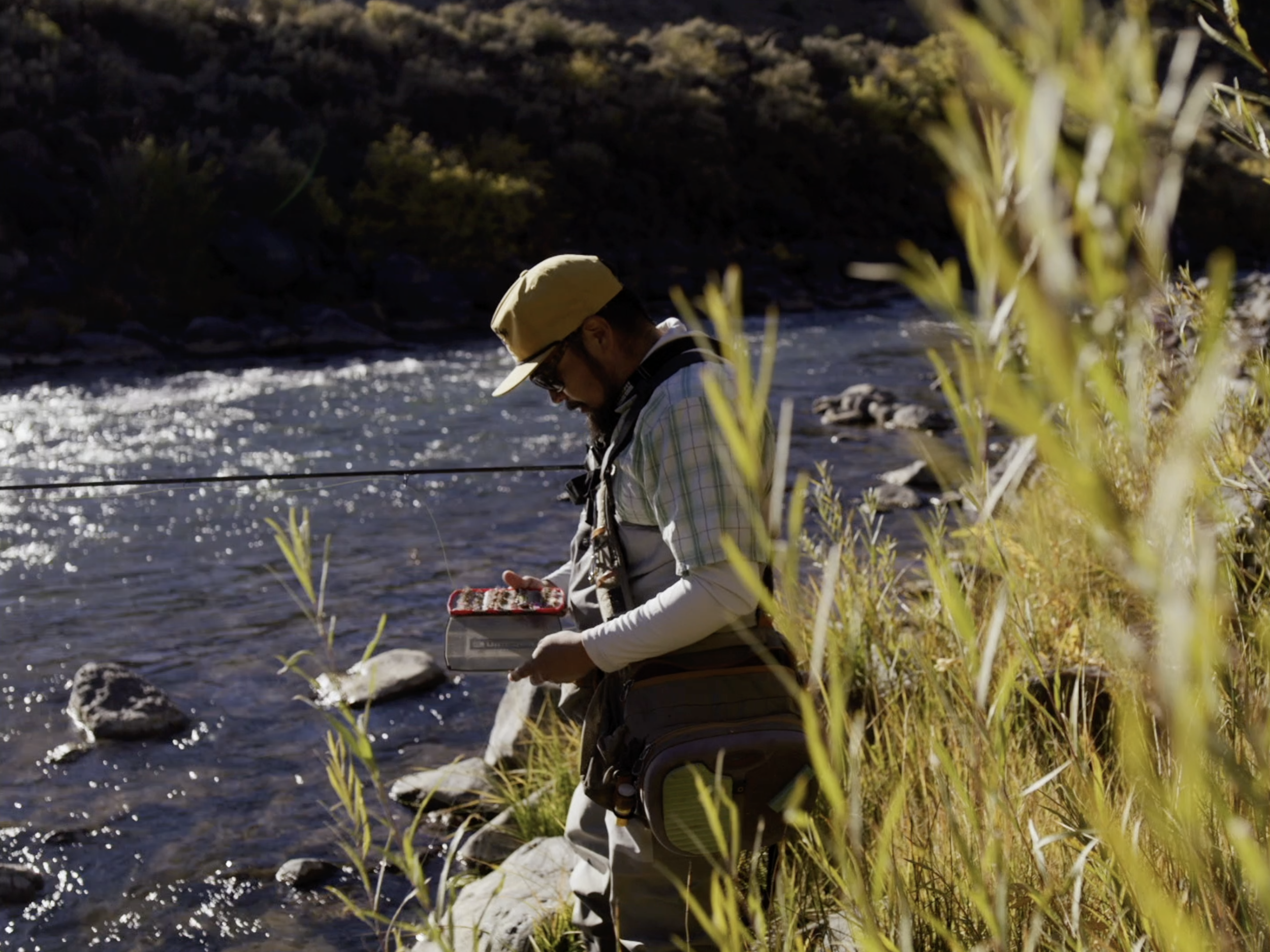Tied to the Water: Interview with Native Angler Norman Maktima
NativesOutdoors filmmaker Isaiah Branch-Boyle teamed up with Umpqua Feather Merchants, and fellow filmmaker Brendan Young to highlight the story and significance of the talented Indigenous fly fisherman, Norman Maktima, through the short film Tied to the Water.
Norman Maktima is a San Felipe Pueblo tribal member and grew up tying flies and fly fishing on the Pecos River in New Mexico, as well as various rivers and lakes in the southwest. He started in competition as a member of the Youth Fly Fishing Team USA in 1997 and won the individual gold in the first World Youth Fly Fishing Championship in Wales, UK. Following as a competing member of Fly Fishing Team USA in 9 World Championships, winning gold at the 2018 National Fly Fishing Championships. Norman has also been a guide for 22 years out of the Santa Fe area with High Desert Angler. Norman’s career as a competitor and guide facilitated his development of fly designs that have been produced around the world and on local waters.
We invited Norman to talk about his experiences in a live interview session with NativesOutdoors CEO, Dr. Len Necefer. The transcript of their conversation below has been edited and condensed for clarity.
Len: It’s awesome to hear about the experiences you’ve had in competitive fly-fishing. I can imagine there have been very few native folks in this space over the past few decades, so how has fly fishing changed in your lifetime and where is it going?
Norman: Well, it’s very interesting. What was cool about being in the competitive realm is that I was basically at the forefront of this sport, helping it grow and evolve. Apart from that, with social media and these platforms that we have availability to, we're able to show what we're accomplishing. One of the things I'm seeing a lot more folks of color, brown folks getting out there and fly fishing. It's not so much of a closed bubble anymore and It's great and we're seeing this community grow more and more. You have a lot of folks out there pushing for outdoor equality and equity and we're seeing a lot of people getting into it. It is becoming more inclusive even though it still has this uptight white old white guy vibe.
Growing up, I was the only kid out there and I think people were just always amazed to see me and what I was able to do and accomplish. It’s interesting to see the evolution of the sport through the years, my influence along with Team USA and the competitive realm. There have been a lot of positive changes and growth happening in the sport.
Len: One of the other things that came through in the movie is the significance of water and the people you come from. Could you talk about that and what it means to be an Indigenous fly fisherman?
Norman: Yeah, in Pueblo culture and most indigenous cultures, if not all, water holds a very very important aspect in our culture, lives, paths and journeys. There is a concept that water is its own life, a mother taking care of you giving all of us a life force that we’re able to enjoy. Growing up as a kid, water in my culture is very important because we, the Pueblo people, are an agriculture-based society. We relied heavily on water in order to feed our people and so a lot of our ceremony practices, dances and songs all gravitated towards calling for water, acknowledging its importance and the spirit of it.
“THERE IS A CONCEPT THAT WATER IS ITS OWN LIFE, A MOTHER TAKING CARE OF YOU GIVING ALL OF US A LIFE FORCE THAT WE’RE ABLE TO ENJOY.”
Going forth as a fly fisher, water holds power and is a powerful force. Within Pueblo culture too, and in other Indigenous cultures, there are taboos around water for this reason. There are stories that deter people from being too involved in water, because it is strong. Aside from coastal cultures that have really embraced water, desert cultures sometimes teach that water can be very very powerful and take life, not just give it. In my own family, I have had relatives that have drowned and passed away. There have been cases too where competitors and volunteers have been swept away and drowned because they lose their footing or something else. Water has that capability, so as a kid, I was always cautioned and told to be aware and acknowledge that your presence in the water is thereby the water’s choice. I was taught to go in with thanks, reverence and ask for that permission to be there. As an angler and competitor, I don't forget any of those lessons, advice and stories that have been passed to me from my relatives and from generations before them.
“I WAS ALWAYS CAUTIONED AND TOLD TO BE AWARE AND ACKNOWLEDGE THAT YOUR PRESENCE IN THE WATER IS THEREBY THE WATER’S CHOICE.”
With all that water has given me, my career, lifestyle and blessings, I think that I, and the community that’s a part of this, should look after it and do our best in order to maintain a healthy balance with us and the water. To this point, I just finished writing a testimonial to try and get the Pecos river designated a National Outstanding Water Resource that will prevent mining or anything like that from coming through.
Len: That’s kind of a big thing. In talking about the importance of the Pecos River and the threats facing it, as an angler you understand the importance because you understand the ecosystems. In terms of the Pecos river, could you talk about what that place means, what ecosystems are there and why mining is a threat?
Norman: One thing about the Pecos river is that it faced these issues already in the past with the Terrero mine that finally went under in the early 1940s, and so the tailings and mine shafts and all that was exposed. Growing up as a kid, they used those tailings as fillers for the road in that area, so that exposure was always there. And in the early 90s, there was significant runoff from the rain or snowmelt, and I was pretty young but I remember all those tailings and pollutants washed into the river and killed hundreds of thousands of fish. Not only did we lose a lot of that population, we lost a lot of the aquatic insect base which is the base for the trout to feed, and it's had a huge effect on algae growth. So when you're looking at a river as an Indigenous angler, you’re not just looking at the river, you’re looking at the entire ecosystem, the riparian, watershed, as well as the community, including the aquatic community and the terrestrial community. All of this plays in the cycle of water and how you get the quality of water you need to sustain a good healthy fishery. Growing up, I was always kind of a nerdy kid. I loved ecology and ecological sciences. Actually, I have a degree in ecology from Whitman College up in Washington. As a fly fisherman, you look at daily and seasonal cycles a lot of the time. You look at heat, the light of the day, climate, weather, temperatures and how that affects aquatic insects will behave, and what the hydraulics are doing at a given time and how that impacts where you’ll find fish. I tell a lot of people who want to get into fly fishing and learn about it, its several arts and sciences all rolled into one sport. Coming from the background that I have, I can kind of piece it all together. But for people who are just getting into it, there are a lot of factors that influence how productive you become.
Len: I think that's an interesting thread. It sounds like fly-fishing at a young age led to what you studied in college. Would that be a correct assumption?
Norman: Yeah, like I said, I was pretty nerdy and I fly-fished starting when I was seven years old, I was totally made fun of by everyone around me, my family, friends at school. I was definitely the outcast, the weird kid. But I didn’t care. At the same time, I loved watching Wild America, my cousin used to call me Marty Stouffer because I was into wildlife and ecology and all that. I had that sort of influence as a kid and that draw to figure out and understand how all that works together. Now everyone wants to be a fly fisherman!
Len: Yeah. When your passion also becomes your profession, especially in Native communities, this is a powerful example that I think there is not enough of.
To learn more about Norm’s work follow him on social media

